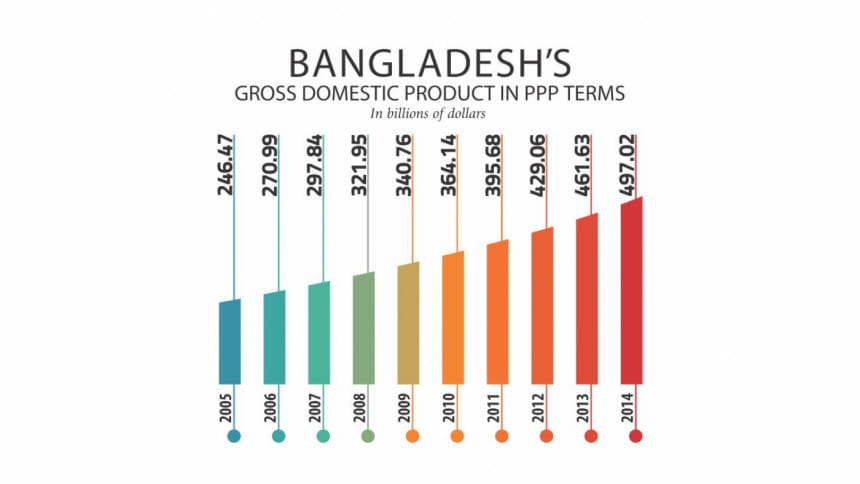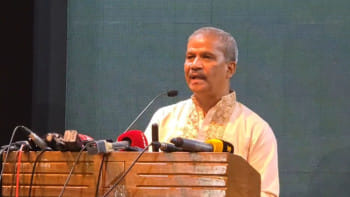It's an honour, not worry

Bangladesh will not lose the trade benefits it enjoys as a low-income nation due to its graduation to the lower middle-income bracket but gain a lot of admiration, ministers and economists said yesterday.
Revelling in the achievement, Finance Minister AMA Muhith said: “We had been a low-income country for more than 40 years. We had set a target to achieve it by 2021. Now, we have got it.”
The country's per capita income reached $1,080 in 2014, which is higher than the World Bank's criteria to move up to the lower middle-income bracket.
To be in the lower middle-income category, a country's gross national income has to be $1,046 at least.
Muhith said the achievement manifests the country's ability to “stand on its own feet”.
“We have already started to prove it. We are doing many things on our own. We are not taking huge amounts of foreign aid.”
Foreign aid now constitutes 1.8 percent of the country's gross domestic product, according to Muhith. It was over 8 percent three decades ago.
Despite the elevation in the World Bank's rankings, Bangladesh will continue to receive the trade benefits it is entitled to as a least developed country at least until 2021, as graduation from the LDC and the income classification of the WB are separate things.
The inclusion in the LDC group gives member countries preferential trade benefits. On the other hand, the WB's income classification determines lending eligibility.
For example, Bangladesh now gets concessional loans from the WB and is not entitled to its market-based commercial loans as the latter depends on the country's repayment capacity.
But as the country gets richer it will help the public and private sectors to borrow commercially at lower interest rates, an economist said.
Each year on July 1, the WB revises the income classification of the world's economies based on estimates of gross national income per capita for the previous year.
Ahsan H Mansur, executive director of Policy Research Institute, said the recognition would bring positive benefits for the country.
He said the Organisation for Economic Cooperation and Development (OECD) has already cut the costs for opening letters of credit for Bangladeshi businessmen.
“This benefit would be more solid. The country's sovereign credit risk would also be lower.”
The former economist of the International Monetary Fund said Bangladesh would not lose its trade benefits because of the graduation.
Zahid Hussain, lead economist of the World Bank's Dhaka office, said it enhances the country's stature on the global stage. “Bangladesh will not lose much.”
However, the graduation to upper middle-income status would disqualify the country for concessional loans from development lenders, he said.
“But it is still far away,” Hussain said, adding that the country will have to lift its per capita income to over $4,000 to become an upper middle-income nation.
Issues have also been raised as to whether the country would come out of the least-developed countries' group and lose trade benefits.
“A country does not lose trade benefits the moment it comes out of the LDC group. The international community gives time,” Mansur said.
“I think Bangladesh will get sufficient time to get prepared. By the time we come out of the LDC group, the country will be richer and improve its performance in various social indicators.”
The United Nation's Economic and Social Council (ECOSOC) decides whether a country will be grouped as an LDC or not. It revises the classification every three years and is due for a review later this year.
Its decision is based on three indicators: per capita income, human assets and economic vulnerability.
Bangladesh has already reached its target on economic vulnerability and is shy of only 2 percentage points from achieving the same for human assets, according to Muhith's budget speech last month.
Bangladesh is also poised to reach the target $1,242 per capita income after the Bureau of Statistics reported provisional GNI per capita income of $1,314 for the just concluded fiscal year.
“I firmly believe that by 2018 we will be able to meet all three criteria,” Muhith said in his budget speech.
Even if a country comes out of the LDC group, it continues to enjoy the benefits for another three years.
A government official said the government is preparing to move out of the LDC group by 2018, when the review of the ECOSOC will take place.
When Bangladesh emerges from the LDC bracket, it will lose some trade facilities such as the Generalised System of Preferences or GSP, Hussain said.
“It will happen when the economy's strength grows. It's better to have an economy on a strong footing than living as a poor country.”
Bangladesh has also been recognised as the 35th largest economy in the world in purchasing power parity as per the WB's latest ranking.
The country's GDP stood at $497 billion in terms of purchasing power parity last year, said the Washington-based multilateral lender.
Purchasing power parity is a method of currency valuation based on the premise that two identical goods in different countries should eventually cost the same.
The latest figure made the country the third largest economy in South Asia after India, which is placed at third overall, and Pakistan (24).
Bangladesh's GDP went up by 7.66 percent in 2014 compared to 2013 when it was $461.63 billion, and has doubled since 2005 when it was $246.47 billion, according to the WB statistics.

 For all latest news, follow The Daily Star's Google News channel.
For all latest news, follow The Daily Star's Google News channel. 



Comments